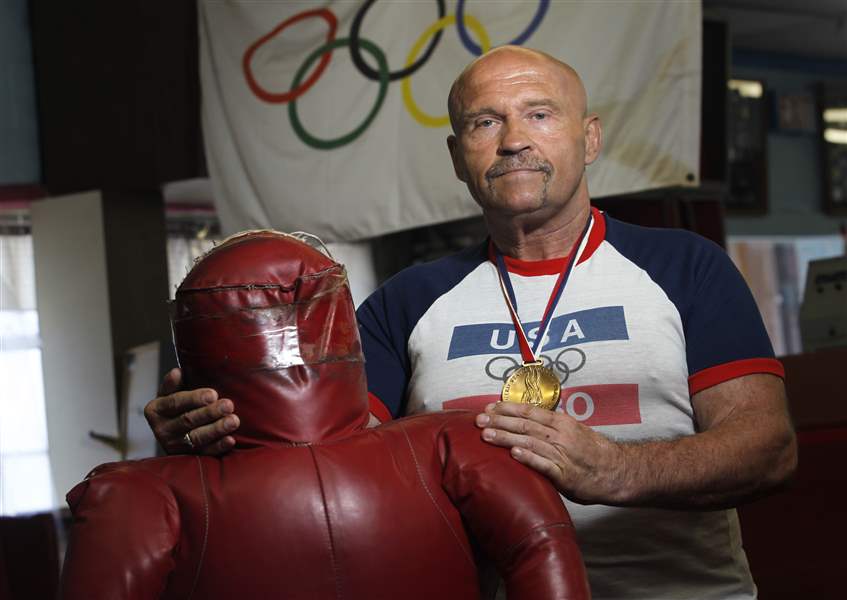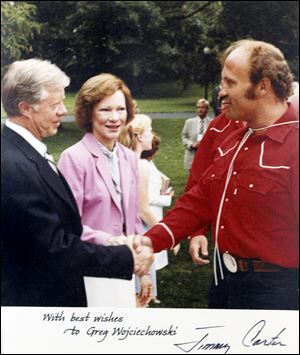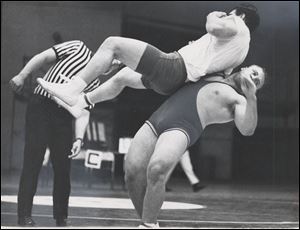
1980 boycott kept Toledoan from fulfilling his dream
7/1/2012
Greg Wojciechowski, during a trip to the Dick Torio Health Club, wears the medal awarded to 1980 Olympians by President Jimmy Carter.
The Blade/Andy Morrison
Buy This Image

Greg Wojciechowski, during a trip to the Dick Torio Health Club, wears the medal awarded to 1980 Olympians by President Jimmy Carter.
Greg Wojciechowski's Olympic story is as much about being able to get up off the mat as getting on it.
In the spring and early summer of 1980, Wojciechowski, still recognized as this area's most accomplished wrestler, finally reached a lifelong goal. He earned a spot on the U.S. Olympic freestyle team as its heavyweight.
To nail down that position he had to beat two formidable foes -- 1976 Olympian Jimmy Jackson of Oklahoma State and eventual four-time Olympian Bruce Baumgartner, who would later win two Olympic gold medals, one silver, and one bronze.
This coveted achievement came after Wojciechowski had heartbreakingly finished as runner-up for the U.S. heavyweight spot in three previous Olympic trials, in 1968, 1972, and 1976.
In 1972, in fact, the 6-foot, 260-pound Wojciechowski came in second for a U.S. Olympic team spot to his collegiate rival -- Iowa State's Chris Taylor -- in both the freestyle and Greco-Roman heavyweight divisions.
His deferred joy in 1980 was short-lived, however, as Wojciechowski -- a two-time Ohio high school champion at Whitmer, the 1971 NCAA heavyweight champion to go with national runner-up finishes in 1970 and '72 while at the University of Toledo -- never got to the 1980 summer games in Moscow.

Greg Wojciechowski hoists Rogers High School's Byron Rhodes as referee Harvey Bowles officiates at the University of Toledo during Olympic trials qualifying rounds in 1968. Wojciechowski finished as runner-up for the Olympic team in 1968, 1972, and 1976. He finally made the team in 1980.
Wojciechowski, along with the rest of the U.S. team, plus 60 other nations, stayed home as part of an Olympic boycott ordered by then-President Jimmy Carter. The boycott represented Carter's protest against the host Soviet Union for having invaded Afghanistan in December of 1979.
Carter's January, 1980, State-of-the-Union proposal to stage the boycott -- if Russia did not pull its armed forces out of Afghanistan within 30 days -- was backed shortly thereafter by a 386-12 confirmation vote by the U.S. House of Representatives, and eventually was executed.
Thirty-two years later, many of the U.S. athletes who were denied participation in the 1980 summer games in Moscow, still do not agree with Carter's decision. The primary argument centers around separating politics from athletics, and Wojciechow-ski is one of those athletes.
As much as it pained him not to compete in the 1980 games, Wojciechowski claims to maintain a more pragmatic attitude about the dilemma.
"I would have loved to have gone to the Olympics, but I was happy to just make the team," Wojciechowski said recently at the Dick Torio Helath Club. "Three times I was so close, and finally I made it. I figured I could retire happy now. I didn't feel that bad."
But what about the what-ifs?
"Realistically, I think I could've finished third [bronze medal]," Wojciechowski said. "I had matches in 1978 at the world team tryouts and camp. I beat the Polish guy, and I beat the East German guy 12-9 in a good match. He came in fourth at the [1980 Moscow games], and the Polish guy came in third. With a good draw, I think I could've gotten a bronze medal. I could never beat the Russians."
Wojo
Say the name, "Wojo" around Toledo and folks of several generations will identify in their minds the image of the barrel-chested wrestler with the shaved head and menacing Fu-Manchu-framed scowl.
This would be the look of Wojciechowski's latter years in pro wrestling with the World Wrestling Association in Indianapolis, during his 12-year run as The Great Wojo.
Wojciechowski was cut from the cloth of legend, with strength and athletic skill honed from an early age at the Dick Torio Health Club in west Toledo.
He began lifting weights at age 5 under the guidance of his father, Richard Wojciechowski, who brought the burly youngster to Torio's gym three years later.
By age 11, "little" Wojo was up to 150 pounds, by the end of his sophomore year at Whitmer High School, already an accomplished wrestler and power lifter thanks to his training at Torio's, he was up to 237 pounds.
"When [Wojo] was 8 years old, I told Joe Scalzo, who was kind of the father of wrestling in northwest Ohio, 'See that little chubby kid? He's going to be a national champ,' " said a now-82-year-old Torio from his motorized wheelchair inside his health club, which has been open since 1957 and will close in mid-July.
"Joe looked at me funny, because I'm kind of a braggadocios type of guy. But I said, 'I tell you Joe, he has concentration and, no matter what you tell him to do, he tries. He's not doing it yet, but he's got the intensity.'
"Then he won 13 national titles. He won in Canada, Mexico, made the Olympic team, wrestled in world competition. We knew what we were talking about."
Scalzo and Torio began entering Wojciechowski in AAU national tournaments, and over the years he collected 13 national titles on the mats.
"I had a big edge over my [youth] competition because most schools didn't even have junior high programs back then," Wojciechowski said of his early preparation. "I was one of the few kids to start at a young age, plus I got the early start in lifting. That gave me a big edge over everybody."
From the start it was easier for young Wojo to dream big dreams, because his daily environment made the world seem a little smaller.
"My [eventual] college coach, Dick Wilson, was training here [at Torio's]," Wojciechowski said. "He was a three-time Olympian, so I had a good role model. I set that as a goal -- to make the Olympics.
"That same year, 1960, [Toledo boxer] Skeeter McClure won the Olympics, so I planted it in my head that I wanted to win the Olympics. It was a perfect environment for me."
First things first
As a student-athlete at Whitmer, Wojciechowski, who also played football for the Panthers, found another tailor-made situation for himself in the school's wrestling room.

Greg Wojciechowski hoists Rogers High School’s Byron Rhodes as referee Harvey Bowles officiates at the University of Toledo during Olympic trials qualifying rounds in 1968. Wojciechowski finished as runner-up for the Olympic team in 1968, 1972, and 1976. He finally made the team in 1980.
His coach was Steve Kerlin, a guy who knew his way around a mat, and with an approach that fit Wojo's personality.
"Steve Kerlin was an ex-UT wrestler and a MAC champ. He was also an ex-Marine drill instructor, and he treated us like we were Marines," Wojo recalled in a 2005 Blade interview. "Everybody had to have butch haircuts, and it was like going through basic training.
"But he also allowed us to have fun. We had discipline, and we had fun. Those were probably my favorite years of wrestling."
Turning in a 13-5 varsity record as a sophomore at Whitmer during the 1965-66 season, Wojciechowski was inspired to improve and cranked up his training regimen.
He never lost again on the prep mats, going 26-0 as a junior in 1966-67 and 25-0 as a senior in 1967-68, capping each season with an Ohio state heavyweight championship.
"When I was a sophomore, I weighed about 205 pounds," Wojciechowski said. "But I lifted real hard between my sophomore and junior years, and I got up to about 235. Then I went pretty easily as a heavyweight. I was 51-0 the last two years.
"That first state championship was a big one for me because it gave me the confidence I needed to keep working hard and shoot for my next goal -- making the Olympic team."
Staying home
When it came time to pick a college, Wojciechowski found out that remaining in Toledo and becoming a member of the Rockets' wrestling team was his best option.
"Greg had a chance to go to Michigan or Iowa State," Torio recalled. "He could've gone anywhere. But, because we had guys like Paul Elzey and Don Wyper around here [at Torio's] to wrestle with him, he liked it here.
"He visited Michigan to see about going there, and the national champ heavyweight they had there at the time, Dave Porter, was working out with the team manager. Wojo said, 'I've got guys here [in Toledo] I can work out with all the time.' So, he came here [to UT] instead."
"Basically I just had great workouts here," Wojciechowski said. "I had Dick Torio coaching me, and I had Don Wyper and Paul Elzey, former University of Toledo football players and wrestlers. So, I had great workouts.
"When I went to visit Michigan, Dave Porter was working out with their towel boy. For a heavyweight, especially, you need to have good workout partners. For me in an individual sport, it made sense to go to Toledo. I had the perfect situation right here."
Not able to compete on the varsity as a freshman because of NCAA rules in place at the time, Wojciechowski took the UT mats by storm as a sophomore. And, why not? He had already nearly made the U.S. Olympic team at the team trials not long after finishing up at Whitmer in 1968.
Wojciechowski advanced to the NCAA heavyweight finals in 1970 before falling 11-2 to defending champion Jess Lewis of Oregon State.
The following year, there was no stopping Wojciechowski, who returned to the NCAA heavyweight finals in 1971, and took a 5-3 decision over Dave Joyner of Penn State to win the national championship. Joyner currently serves as athletic director at Penn State.
"Joyner went to medical school and became an orthopedic surgeon. He made the Olympics years later as a team doctor," Wojciechowski said. "I wondered, who was the real winner there? I was knocking my head against 400-pound wrestlers for years before I finally made the Olympic team, and he did it as a doctor."
Land of giants
It was back to the NCAA finals for a third straight year in 1972, but this time Wojciechowski found winning a title meant moving a mountain, something he was unable to do.
His opponent was Taylor, a behemoth 6-foot-4 and 415 pounds (eventually 460), in the days when the heavyweight division was appropriately labeled as unlimited.
Taylor topped Wojciechowski 6-1, and later that year also edged the Toledo wrestler for spots on both the freestyle and Greco-Roman teams on the 1972 U.S. Olympic squad for the summer games in Munich.
"He was just too big" Wojciechow-ski said of Taylor. "I couldn't move him around. I beat him earlier in his career. But he went to Iowa State, and they taught him how to use his weight better. Plus, he got bigger.
"When I beat him, he was probably about 400 pounds. Then he got up to about 460."
"I was runner-up at U.S. Olympic trials in 1968 coming out of high school," Wojciechowski said. "I lost to Bob Roop [in freestyle] from Southern Illinois. In 1972, I lost to Taylor in both freestyle and Greco-Roman. That was my political hosing right there. Until that year, they never let a guy wrestle both freestyle and Greco-Roman.
"By 1976, I had dropped down to 220 for four years. Russ Hellickson beat me, and he was second at the Olympics at 220. And there was a guy who came along in Greco named Brad Rheingans from Minnesota. I wrestled a couple good matches with him at the national tournament. He beat me about 7-4. I did the best I could have.
"So, for the camp, I went up to heavyweight. I wrestled 22 matches in six days, and I had to work my way up the ladder from the bottom. Jimmy Jackson of Oklahoma State beat me in the freestyle, and he eventually got the bronze medal. He was 6-6 and 380 pounds. In the Greco, I lost to Pete Lee, who was about 6-2, 380. I beat him in the first match of a 2-out-of-3. The second match I had him on the ropes, and he came out in the third period and caught me in a bear hug and threw me. In the third match, he pushed and shoved me and beat me by one point.
"It was crushing. I already had two kids at home at that time. I was just missing, and I had these human giants I had to compete against all the time. I thought I might not ever be able to do it."
"At that point [after the 1976 trials], I quit. I quit for about a month. Then I started working out with some of the heavyweights here at Torio's. Just some of the local kids. I started having fun again, and I'm glad I stayed with it because after that I think I won every nationals in the freestyle and three out of four in the Greco."
Aftermath
It was about a three-week span between making the team and finding out he wasn't going.
"It was a flat feeling," Wojciechow-ski said. "There were rumors going around. Early in July, we went to the final tryout camp, and we started to hear about a boycott."
Did he agree with President Carter's position and decision?
"No, not really," he said. "It was like a little kid saying to you, 'If you're not going to play with me nice, I'm going to take my ball and go home.' I didn't agree with it at all.
"Hindsight is 20-20, but the reason [for the boycott] was that the Russians invaded Afghanistan. Now we have our soldiers over there dying."
Wojciechowski and the other U.S. summer Olympic team of 1980 was invited to the White House in August of that year for a four-day celebration at which they were presented with medals of appreciation by President Carter.
"I didn't have a chance to talk to him much," Wojciechowski said. "It was an assembly line. The whole team was lined up. I was in awe just meeting the President.
"I don't have any ill feelings."
"We were all terribly disappointed," Torio said of Wojo being deprived of competing. "We had a whole group of people arguing with Carter about that, but they didn't go."
"About a month after I came back from Washington, I turned pro," Wojciechowski said. "I wanted to do that. Dr. Jerry Graham, Jr., worked out here at Torio's, and he helped me get started.
"It was different. It was a lot more theater. You had to entertain the fans. I enjoyed it most of the time, and I don't regret doing it. I made some money, and I guaranteed my kids [three sons] a college education.
"I did it off and on for 12 years, always part time. I was always also teaching and coaching at the same time. I taught for 28 years. One year at Archbold, and the last 27 at Libbey. I enjoyed coaching. That was my niche. If I had made the 1972 Olympic team, I'd have turned pro immediately. So, it worked out for the best.
In 1999, while working out on the mat at Torio's with a high school prospect from Central Catholic, Wojciechowski felt a burning pain in his chest, and then became lightheaded. Paramedics were called, and Wojo had sustained an injury known as a dissected (torn) aorta. Although his condition was touch-and-go for a while, the surgery to repair Wojciechowski's aorta proved successful.
"When I thought I was on my deathbed with that dissected aorta, I praised God that everything was going fine and that I had a good life," he said.
"What I tell young kids now is that I think I'm a good example for setting a lofty goal and sticking with it. I just missed it three times, and finally I made it.
"Even if I hadn't made it in 1980, I still had reached a lot of secondary goals along the way, and I got to travel all over the world. Growing up in my family, if we got to go to Cedar Point, that was our big trip for the summer. I traveled all over the country, and all over the world. There were a whole lot of secondary benefits. I feel lucky. I achieved about all my goals athletically. I probably wouldn't change anything."
Contact Steve Junga at: sjunga@theblade.com 419-724-6461, or on Twitter @JungaBlade.